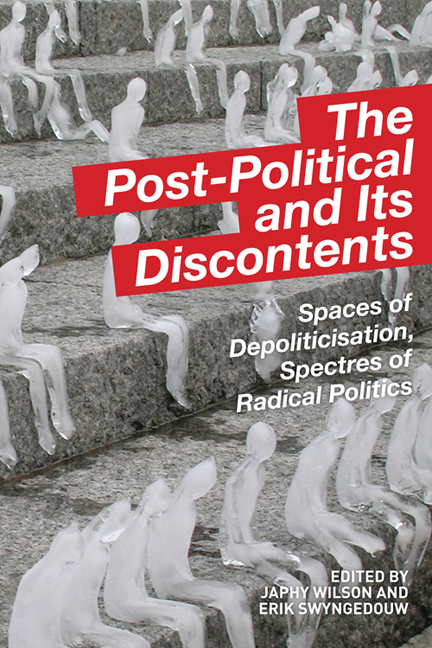Book contents
- Frontmatter
- Contents
- List of Contributors
- Seeds of Dystopia: Post-Politics and the Return of the Political
- Part I Spaces of Depoliticisation
- 1 The Post-Politics of Sustainability Planning: Privatisation and the Demise of Democratic Government
- 2 The Post-Political and the End of Nature: The Genetically Modified Organism
- 3 The New Development Architecture and the Post- Political in the Global South
- 4 Opening Up the Post-Political Condition: Multiculturalism and the Matrix of Depoliticisation
- 5 The Jouissance of Philanthrocapitalism: Enjoyment as a Post-Political Factor
- 6 Religious Antinomies of Post-Politics
- 7 Post-Ecologist Governmentality: Post-Democracy, Post- Politics and the Politics of Unsustainability
- Part II Spectres of Radical Politics
- There Is No Alternative
- Index
6 - Religious Antinomies of Post-Politics
from Part I - Spaces of Depoliticisation
Published online by Cambridge University Press: 05 August 2016
- Frontmatter
- Contents
- List of Contributors
- Seeds of Dystopia: Post-Politics and the Return of the Political
- Part I Spaces of Depoliticisation
- 1 The Post-Politics of Sustainability Planning: Privatisation and the Demise of Democratic Government
- 2 The Post-Political and the End of Nature: The Genetically Modified Organism
- 3 The New Development Architecture and the Post- Political in the Global South
- 4 Opening Up the Post-Political Condition: Multiculturalism and the Matrix of Depoliticisation
- 5 The Jouissance of Philanthrocapitalism: Enjoyment as a Post-Political Factor
- 6 Religious Antinomies of Post-Politics
- 7 Post-Ecologist Governmentality: Post-Democracy, Post- Politics and the Politics of Unsustainability
- Part II Spectres of Radical Politics
- There Is No Alternative
- Index
Summary
… if it is true that God is the place where humans think through their decisive problems … (Agamben 2011a: 4)
… the criticism of religion is the first premise of all criticism. (Marx 1957: 41)
When much is written about a phenomenon, when it appears to occupy a central position in thought, it is often a sure sign that the phenomenon is about to vanish, illuminating, like a dead star, in the very process of disappearing. One could say that, along the same lines, the concept of ‘post-politics’ gestures towards articulating a vision of a disappearance of ‘politics’ in its radical sense, as the attempt to change society. Indeed interest in ‘politics’ in this sense has been absent in the philosophical and social scientific discourses, except, that is, in the works of a few leftist philosophers such as Badiou, Negri, Ranciere and Žižek. Did their efforts not signify the last, cramp-like movements of a dying concept?
The paradox, however, is that we live as ever in a world saturated with enormous conflicts and misery, and that there is all the more reason to criticise existing and emerging forms of oppression and injustice. After all, if we look at the contemporary world through the prism of radical politics, what we see is precisely a more or less permanent ‘revolutionary situation’ characterised by the co-existence of extreme poverty and extreme wealth. What needs to be explained in such a world is stability rather than destabilising tendencies; why nothing happens, or, why the counter-revolution has been so stable and so strong.
Yet that which has disappeared often returns. Hence phenomena considered to be far away, ‘historical’, or even dead are constantly knocking on our doors, catching us unprepared and perplexed. Were we not told, for instance, more than a few times, that modernity means increasing secularisation, that it inevitably brings with it the disappearance of religion from the political, social and cultural scene? But seen in the prism of contemporary troubles, if there is anything that has not disappeared, it is religion, to the extent that our ‘civilization’ today defines itself with reference to religion, accepting it as the main yardstick to differentiate itself from others.
Hence my main argument: the resurgence of religion (and religious violence) is not an exception to the post-political order.
- Type
- Chapter
- Information
- The Post-Political and Its DiscontentsSpaces of Depoliticisation, Spectres of Radical Politics, pp. 126 - 145Publisher: Edinburgh University PressPrint publication year: 2014



